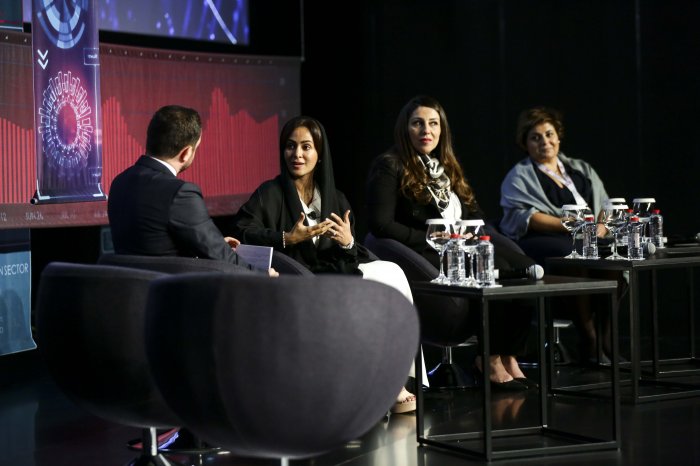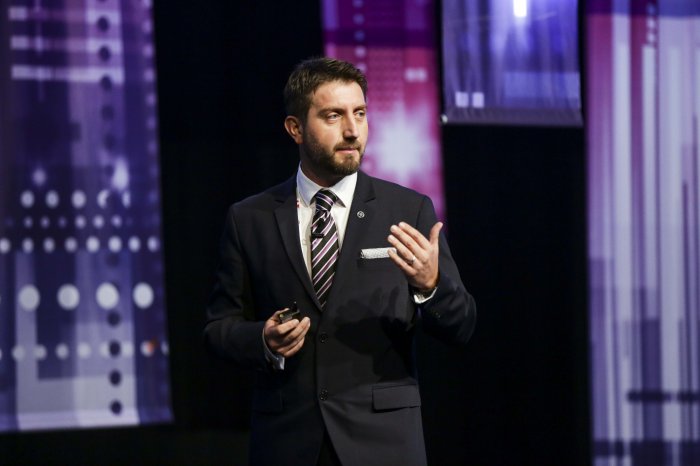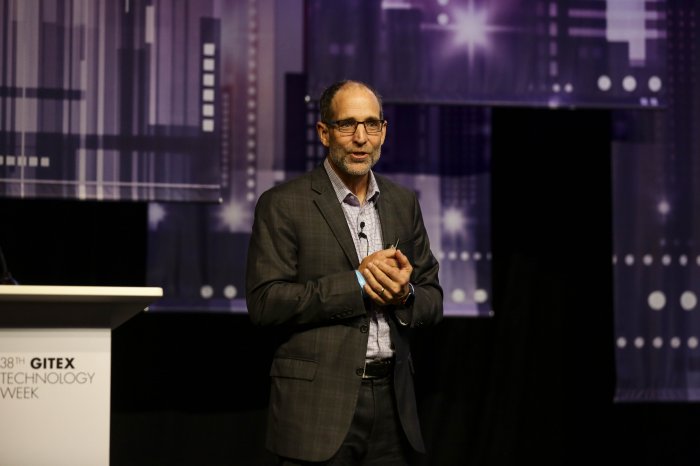
GITEX Technology Week News Highlights
Digital health’s third wave: how tech needs to adapt to enable the next big breakthrough in life-saving treatments
The global head of innovation at healthcare giant Johnson & Johnson stressed upon the importance of collaboration between incumbent operators, drug companies and innovators to enable the next generation of medical tech-led advancement.
Speaking on the last day of GITEX Technology Week 2018, Robert G. Urban insisted that in order to re-imagine healthcare, we need to develop a ‘deep data diary’ that can help us make meaningful decisions.
The American said that our eyes, voice and even the manner and rhythm in which we type characters on a keyboard or keypad are an example of a rich source of data that should be harnessed and pooled for analysis and treatment.
“We will need to move out of ‘silos’ and adopt an integrated model that has data powered by us,” said Urban. “In order to reimagine healthcare, we will need a 24/7 data stream but, more importantly, we will need to personally, deeply care about our health.”
#sheinnovates: Align tech across the learning spectrum and we will reap the rewards – women especially
A panel of inspired women made the case for advanced IT learning across schools on GITEX’s final day – proving how improved access to classroom tech would help even the playing field for female-led tech startups.
Miriam Matar, Founder & Chairperson, UAE Genetic Diseases Association; Ghadeer Abu-Shamat, CEO, Al Khaleej National School and Desiree El Chebeir, VP Digital, McKinsey & Company, discussed the importance of gender balance in tomorrow’s classrooms and the strategies for ensuring that the consumers and producers of tomorrow’s innovations are more widely representative of society as a whole.
Desiree El Chebeir said: “Startups that are led by female founders have shown to provide 36% better financial returns then startups that are male led. So that means you get better value for your money as an investor. Yet only 2% of VC money has gone to female led startups. We have a lot of opportunity for women to improve and economic gain.
“AI is helping to personalise education; access to education is no longer a borderline. Everybody with internet access can get to YouTube or a podcast and get information that way. That’s doesn’t mean we don’t need teachers, that just means that there is a need for integrating technology.
“I am hopeful that we are beginning to see the impact of all of this innovation and it’s very possible that we are changing the status-quo.”
Is Artificial Intelligence the best solution for the Healthcare sector today?
Gokhan Ozkan, Managing Director of Digital Middle East, GE Healthcare, gave an enlightening talk on the implications of Artificial Intelligence in the Healthcare sector during today’s GITEX vertical conference on ‘Healthcare: Hype or Hope? What’s real about the potential of AI in healthcare?’
He brought to light the many different definitions of technology, as well as what AI has come to be.
He said: “Artificial Intelligence basically makes it possible for machines to learn from neuro experiences, adjust outputs and perform human-like tasks, it could be thought of as the simulation of human intelligence.
“Is technology the best thing we as humans have created? Probably, yes. It has made a lot of things easier for many people. But I think that we have created one more thing, which is the well-usage of the technology with ethics. These elements should deeply be taken into consideration, especially in healthcare.”
Competition round-up! A ‘Spike’ in success for double-winning startup as GITEX rewards tech innovation across the board
GITEX 2018 closed its doors today after hosting its most competition-rich event of all time – giving away more than AED 1million across five contests.
The show’s top prize – the startup Supernova Challenge – was won by Lebanese firm Spike, whose diabetes monitoring smartphone app drew universal praise from a five-strong panel of investor judges. Spike’s founder, 25-year-old Ziad Alame, said the $100,000 prize money would go to “advertising, growing the business and making it more solid” as they look to “go global”.
Held on Day Three of GITEX Future Stars, the Mohammed Bin Rashid Space Centre (MBRSC) Space Innovation Challenge sought to discover the world’s best space startup. Singapore-based Equatorial Space Industries were crowned champions – earning a $60,000 top prize, incubation with MBRSC and an agreement for potential future work with both the MBRSC and the UAE Space Agency for their innovative hybrid-engine launch vehicle, aimed to provide efficient and timely launch services to nanosatellite operators around the globe.
GITEX’s debut hosting of the DTCM Future of Tourism Challenge was launched to activate the startup community and uncover the technologies that will help transform the tourism experience in Dubai. Winners were announced across four different categories. Data-driven insight provider Dahub won the Digital Ecosystem Challenge, while digital space mappers KeepEyeOnBall won the AR/VR Challenge. Behavioral pattern analysts Mimirium won the Blockchain Challenge, and Woveon – whose system integrates customer data in a way that is meaningful – were named Artificial Intelligence challenge winners.
Accenture recognised leading startups at its second Accenture Innovation Awards. Nabta, who provide a healthcare app that empowers women to manage their own health by seamlessly integrating traditional forms of care with the latest technologies, was announced overall winner of an all-expenses paid trip to Silicon Valley. The startup also won in the AI category, providing them the opportunity to participate in the Future Now programme, organized by Etisalat Digital.
Held on the second day of GFS, the King’s College Healthcare competition invited start-ups to present a solution that will help improve patients experience and strengthen the patient-provider communication.
In what proved to be their first of two massive GITEX wins, Lebanese startup Spike came out on top, winning incubation with the London school.





























